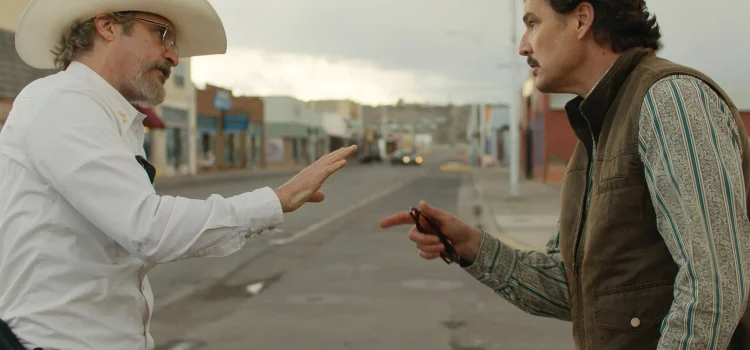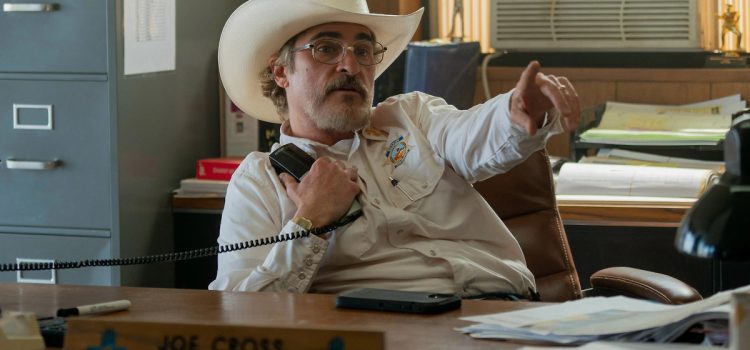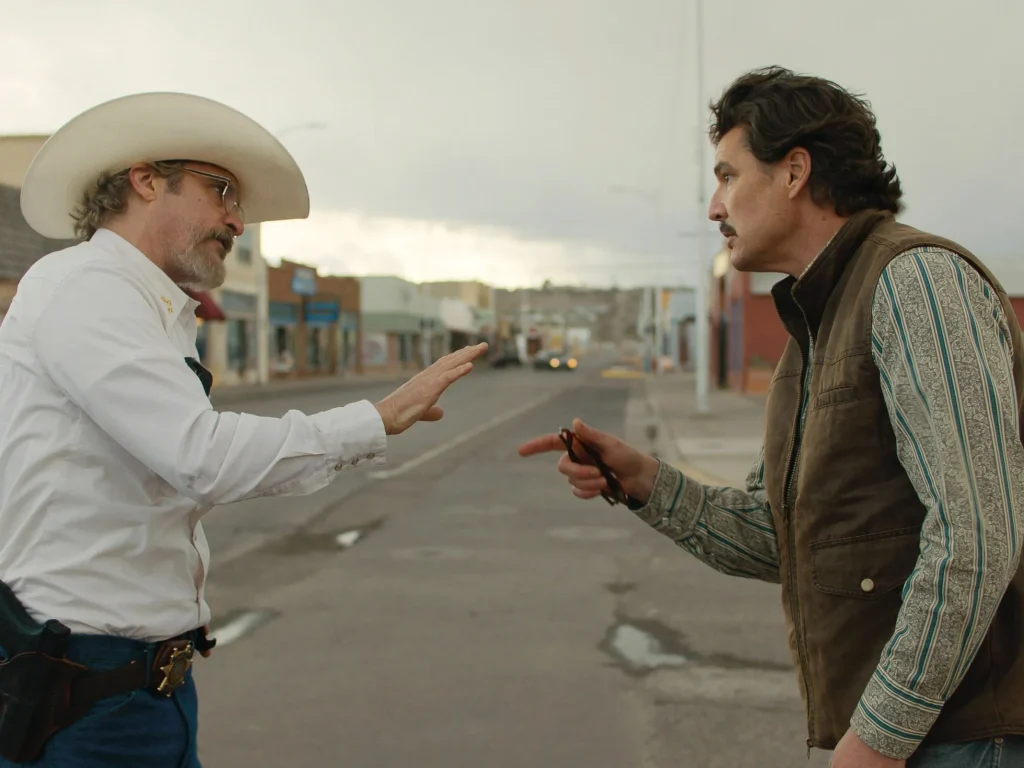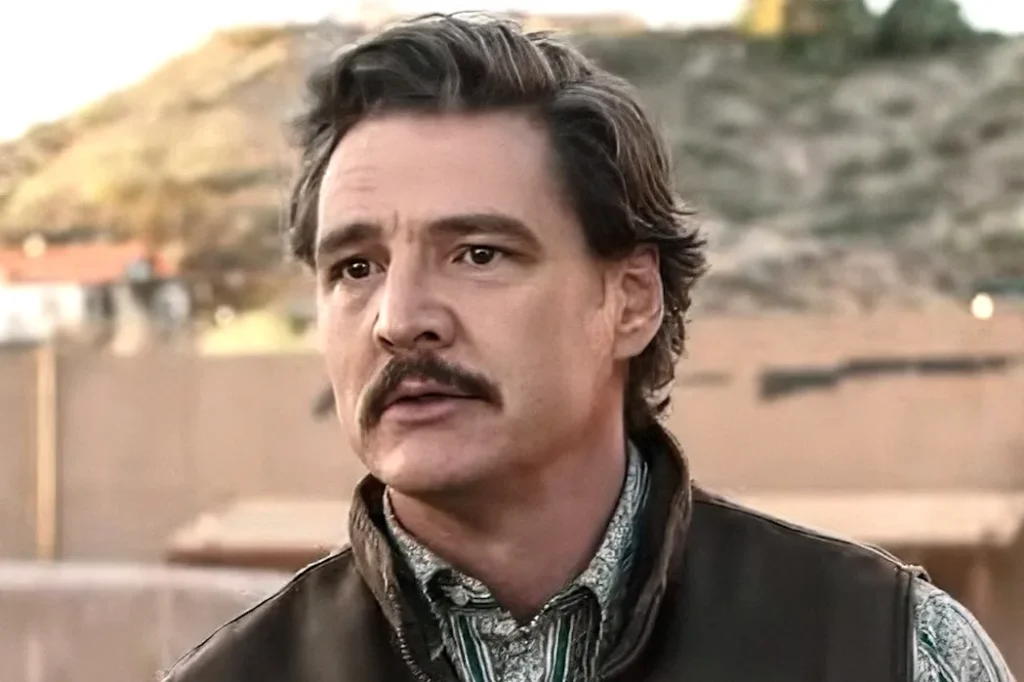By Alex McPherson
Supremely uncomfortable yet ever-watchable, director Ari Aster’s “Eddington” looks back at the chaos of 2020 with a savagely enjoyable microscope.
Our story unfolds within the fictional, sleepy town of Eddington, New Mexico, during May 2020. The COVID-19 pandemic is in full swing, and Eddington residents struggle to navigate this new reality. Some succumb to conspiracy theories, others give into coronavirus paranoia, and everyone is glued to their smartphones.
The sickly allure of echo chambers is impossible to resist amid the cultural and social rifts exposed by an invisible enemy that’s infecting the world. There’s talk of a resource-hogging data center being constructed on the edge of town, the building of which Eddington’s incumbent, left-leaning mayor Ted Garcia (Pedro Pascal) makes a core (positive!) feature of his campaign.
Ted has also instituted a mask mandate for the area. This greatly frustrates the insecure, right-leaning, and asthmatic police chief Joe Cross (Joaquin Phoenix). Joe struggles at his job and endures a home life where a sense of “control” has all but slipped away.
His wife, Louise (a haunted Emma Stone), refuses intimacy because of past trauma and has been drawn into the world of influencers, specifically a cultish, self-help guru named Vernon Jefferson Peak (Austin Butler).
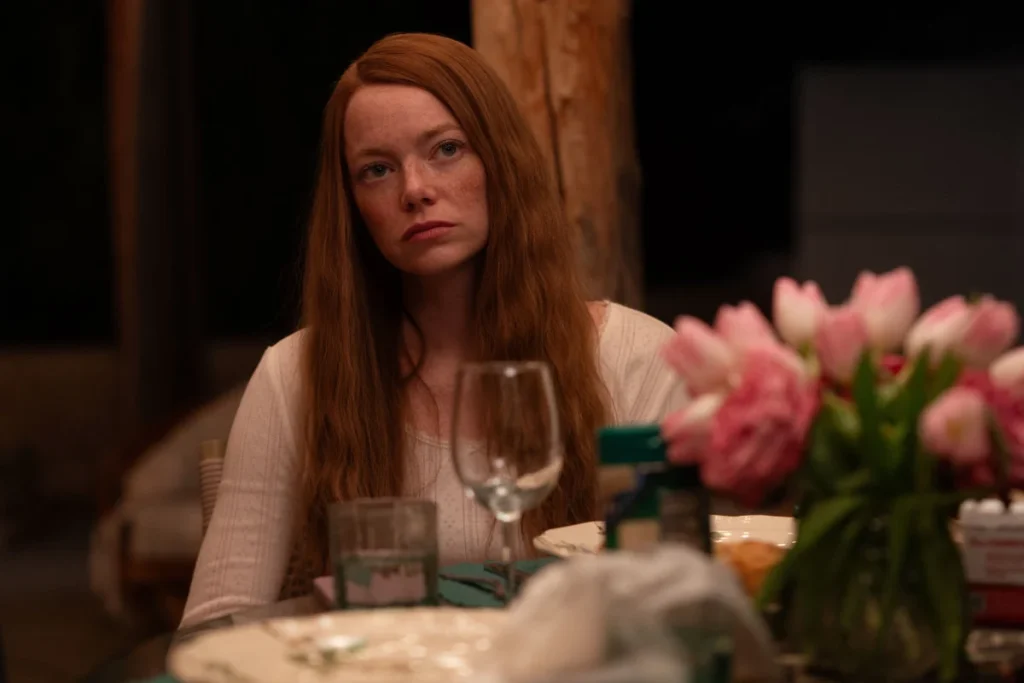
Joe and Louise share their house with Louise’s mother, Dawn (Deirdre O’Connell), who has fully given into “Plandemic” lunacy and is encouraging Louise to go further down the rabbit hole of online BS. Joe is nearing the end of his rope — he believes that something needs to be done to “save the soul” of Eddington or, more importantly, give his unstable self a feeling of power and so-called masculine purpose.
After Joe has a tense debate with Ted over mask-wearing at a grocery store — an elderly man was just kicked out for not wearing a mask — he’s inspired to run for mayor himself, on a platform that demonizes Ted in darkly humorous fashion.
It’s all about “restoring the kindness of Eddington” after all, no matter the exaggerated political signage (complete with misspellings) and inflamed rhetoric. Joe’s anger at Ted extends beyond his politics, though: Ted once dated Louise, and rumors say their relationship did not end well.
Then George Floyd is killed, and everything is thrown further off its axis. Small protests grip Eddington, and Joe can barely keep things under control. Well-meaning but half-informed youths stand up for racial justice, and their eyes are on Michael (Micheal Ward), Eddington’s only Black police officer and perhaps one of the only Black people in Eddington, period.
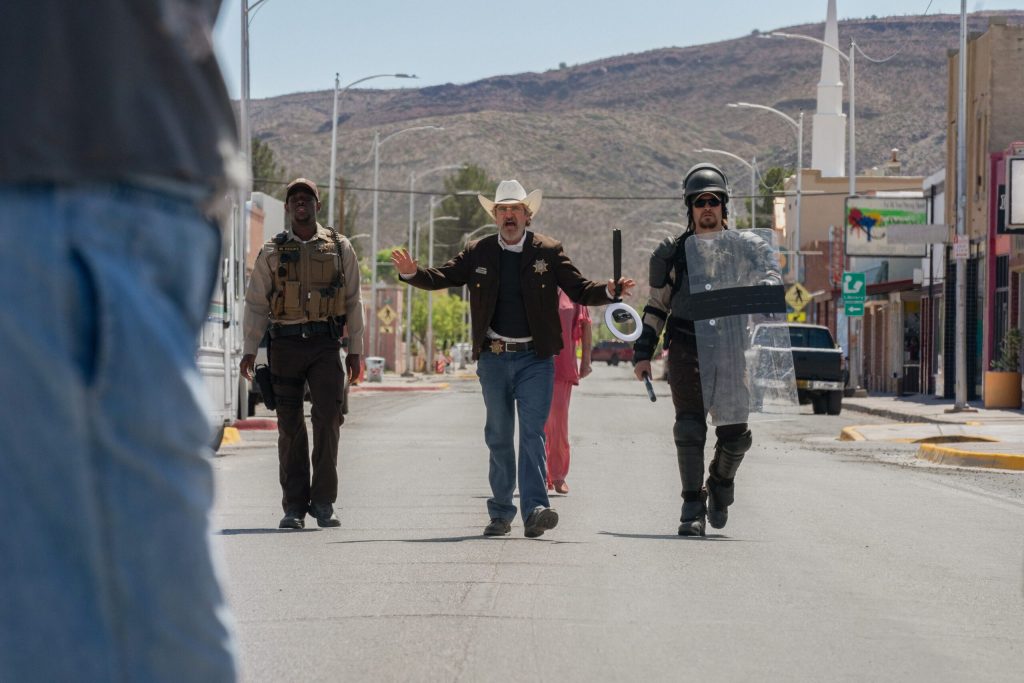
The pandemic, Black Lives Matter, fear-mongering media, anarchists, predators, and the warring campaigns of two egotistical men are all a lot for the town to handle. It’s only a matter of time before things go wildly off the rails.
This is an Aster joint after all, the mad lad who concocted such trippily unsettling works as “Midsommar” and the stylistically envelope-pushing “Beau is Afraid.”
“Eddington” aims closer to home than those films — dramatizing a time whose trauma we’re still grappling with today in heightened, sometimes inflammatory (and polarizing) fashion.
But despite structural and pacing issues resulting from Aster tackling so many hot-button topics, the film, on the whole, accurately reflects our ostensibly doomed present.
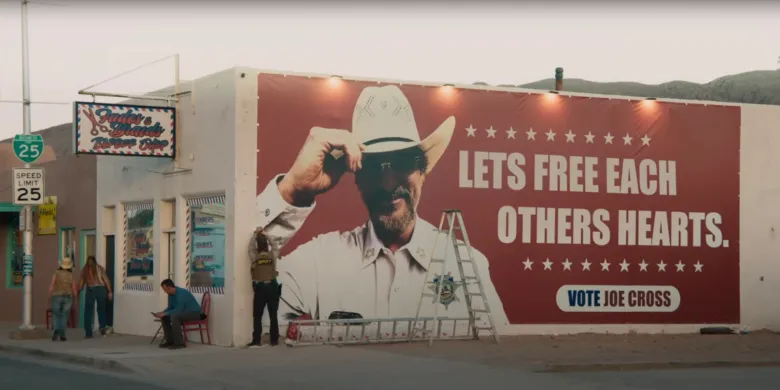
Aster captures a society overflowing with misinformation, emphasizing the pursuit of power, direction, and attention (under the guise of being noble) at the expense of self. Extremes on all sides will collide in train-wreck-catastrophe if, Aster warns, we continue down the same connected-but-isolated path as these characters.
A jolly view of humanity, to be sure, but one that’s rooted in truth despite Aster’s absurdist proclivities and resolute lack of subtlety.
Aster might not be the most psychologically incisive filmmaker out there to tackle the horrors of 2020, retaining a preference for madness over deeper reflection. “Eddington” can be uneven in its shock-value humor and sometimes broad characterization, with Aster throwing everything at the wall to see what sticks.
The film eschews emotional attachment for blunt-force social commentary that condemns our terminally online existence and our propensity for hate — ramming home the ways in which malleable minds can become warped; personal drama rendered violently political.
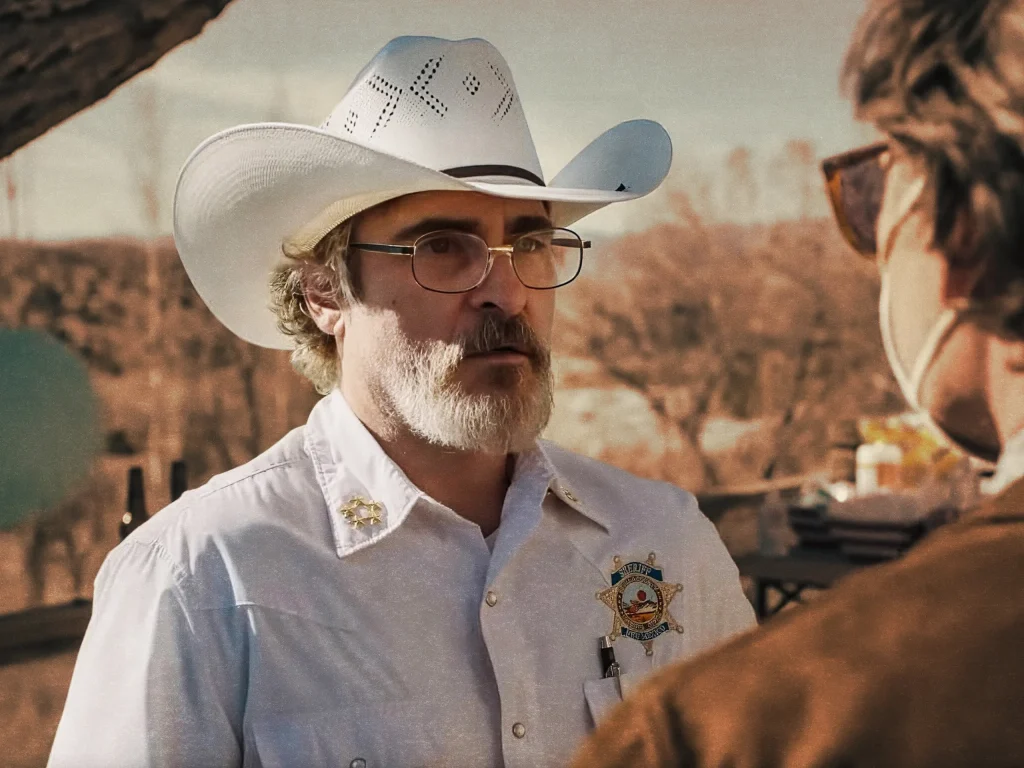
Phoenix, yet again, gives a compelling performance that’s equal parts darkly amusing and disturbing. “Eddington” centers its focus on Joe and his de-evolution to baser, reactionary instincts.
Aster takes pains to illustrate how each facet of Joe’s life is breaking down, emphasizing his pitiful attempts at reconciling with Louise and carrying out his job as sheriff and would-be mayor, each slight building upon the other as Joe takes all the wrong lessons.
He makes his personal vengeance against society become larger than himself. As he becomes increasingly monstrous, though, Joe also becomes more recognizable on an instinctive level. Aster just takes his actions, and the actions of those around him, to extremes within this doomed microcosm.
Almost everyone is put in the crosshairs of Aster’s satire. Teens loudly but in a half-assed way deal with their White guilt (some virtue signaling for the sake of getting laid). Ted’s performative politicking masks a certain darkness, and people like Louise, become swept up into the world of cults masked as self-improvement.
That “Eddington” puts these characters next to antivaxxers and other right-wing conspiracy theorists might imply conflation, but the film primarily spotlights the technologies that drive them.
Indeed, social media infects these characters’ daily lives to an extent that they’re not aware of, taking control of their impulses while innocent parties are frequently caught in the middle.
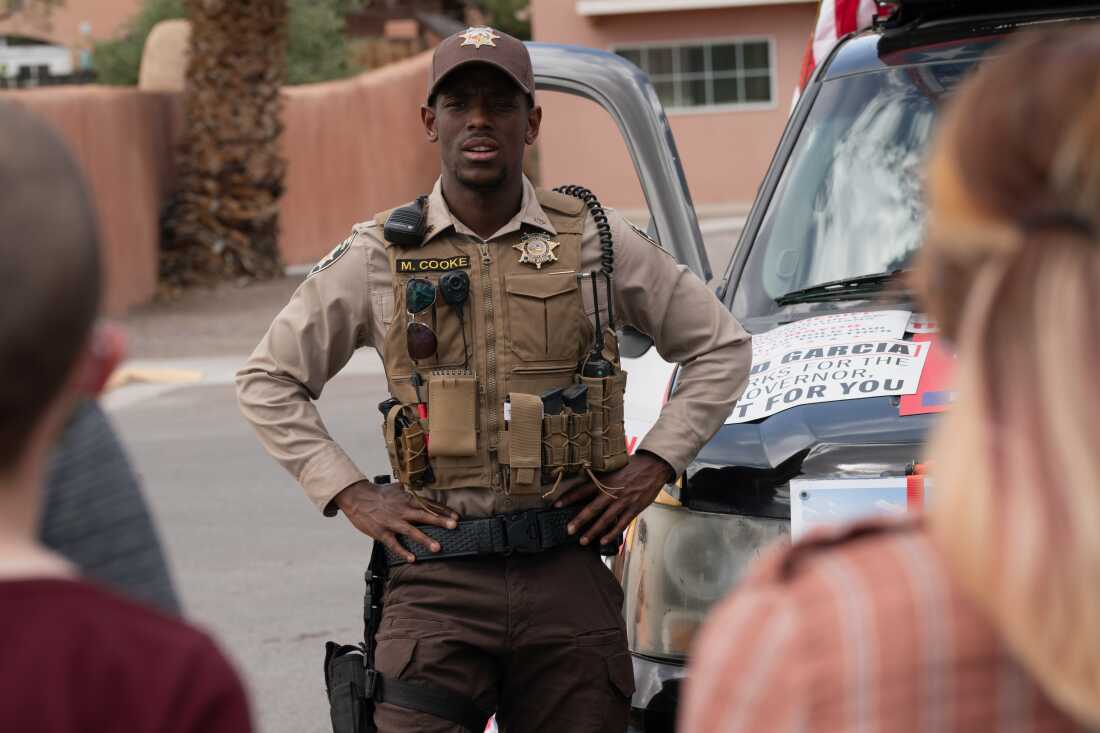
Darius Khondji’s crisp cinematography finds moments of stark beauty amid the arid surroundings, positioning smartphones as a blunt, unnatural intrusion into the frame. Bobby Krlic and Daniel Pemberton’s score furthers a sense of dread punctuated by atonal jolts, reflecting the volatile nature of the story itself.
“Eddington” is most effective in the big picture, sacrificing digging deeper into any one topic for building a swirling, chaotic mélange of everything happening at once, eventually reaching a near-fever-dream pitch of violence and cinder-black comedy.
The film’s free-flow structure can drag in places as it assembles the pieces. This is largely due to the inherent unlikability of most of the characters and a screenplay that, for all its shrewd effectiveness, is hit-or-miss with its “provocative” humor.
Flaws aside, “Eddington is still a valiantly unhinged effort from Aster that’s willing to take real risks. Some will hate it, some will love it, and while its more haphazard elements are distracting, the experience is never less than interesting — a modern western with no savior, just a steady march towards Armageddon.

“Eddington” is a 2025 dark comedy – contemporary western directed by Ari Aster and starring Joaquin Phoenix, Pedro Pascal, Emma Stone, Austin Butler, Deirdre O’Connell, Luke Grimes, Micheal Ward, Cameron Mann and Matt Gomez Hidaka. It is rated R for strong violence, some grisly images, language, and graphic nudity. Its run time is 2 hours, 28 minutes. It opened in theatres July 18. Alex‘s Grade: Rating: B+
Alex McPherson is an unabashed pop culture nerd and a member of the St. Louis Film Critics Association.

